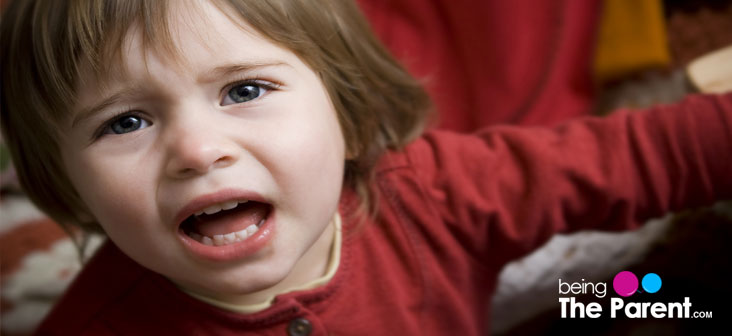Out of all the things that our kids do to drive us crazy, whining has to be the silent killer. It is not a very extreme or damaging behavior, such as shouting or throwing things. However, whining can be very irritating because the half-cry, half-talk badger can continue for a long time driving parents nuts.Why do kids whine? How to deal with it? Read on.

Why Is My Baby Whiny?
The reason behind your baby’s whining is correlated to his age:
- Toddlers most often feel as if they are not in control. They are overwhelmed by everything happening around them – sharing toys with another kid, hunger, lack of appetite, fatigue, too much energy. They are little bundle of contradictions. And when they feel overwhelmed, they whine!
- Preschoolers have a tough life. They are about to start going to school, there is a younger sibling at home who seems to be everyone’s darling, they are treated like big kids when they want to be babyish and babies, when they want to pretend as big kids. They have a low threshold or tolerance to deal with things that are not in their control. And they want your attention. So they whine!
- Grade-schoolers are more manipulative than the younger ones. They want something, but they do not get it – they whine. They are hungry – they whine. They want to manipulate you into getting their way – they whine. They are bored – they whine
10 Effective Ways To Deal With Whiny Babies
How to make your child stop whining is largely dependent on your child’s personality and your parenting techniques. But the following steps can help.
-
- Be calm: It is very easy to lose cool when your child is whining. And if your child sees that her whining is bothering you, she will take it as a win. So be calm, maintain a poker face and tell your child that you refuse to listen to her when she is whining and will listen only when she starts to talk in a normal tone. And then ignore the whining completely
- Teach your child how to “ask nicely”: There is a good chance your child does not realize that she is whining. In such cases, it is important to help her understand the difference between the whining tone and the regular tone. Without making her feel like she is being made fun of, enact and show her the difference. Help her communicate her reasons for frustration in a pleasant way
- Set your expectations around discipline clearly: It is best to deal with whining in the early age. Once they get accustomed to whining, they are likely to become pros as they grow older. Let them know clearly that whining has consequences and make sure you are consistent in implementing your own rules
- Acknowledge good behavior: We ask them to “stop whining” every time they whine. But do we applaud it when they express their displeasure in a calm and normal way? We should. You could say “I am very happy you are asking that nicely. Thanks for not whining”. When they realize that you are noticing their good behavior and acknowledging it, they are more likely to stick to it

- Preempt whining (stop before it starts): Watch out your child’s whining triggers. Does it always happen at nap time? Or does it start when they miss a meal? Or does it happen at the playground? When you know the triggers, you can preempt it. Below are few examples on how to do it:
- If your child always demands cakes or chocolates at a supermarket, then make sure you feed them before you go shopping. A child with a full stomach is less likely to demand treats
- If your child always asks for extra time in the playground, then plan a fun activity right after the playground time and inform your child in advance
- If your child whines on road trips, pack enough snacks and plan enough activities to keep them occupied
- Watch out for nap time: Whining is often related to lethargy and sleepiness. Make sure your baby has a consistent sleep time and she gets good rest. If they are whining in the late evening, may be they want to sleep early. If they are whining in mid-afternoon, they might need an afternoon nap. Watch out for the signs and change the nap schedules accordingly
- Pay attention to food timing: Similar to nap times, hunger is another one of whining triggers. Review your child’s meal timings and make sure that there are not large gaps between two meals
- Reduce sugar intake: Ever heard of sugar-high? When the sugar intake is high, then the child can become hyper. And a sugar-high is normally followed by a sugar-low, which makes them whiny. Watch out for the amount of sugar they consume every day – not just in the form of sweets, but also as juices and processed foods
- Be flexible: Do not take disciplining to autocratic levels. They are kids. They do not want to come from the playground yet. That is normal. Be a little flexible and give them an ultimatum of sorts. “Ok, you can play for exactly 10 more minutes, and then we are leaving”. This way you compromise a little, you encourage your child to compromise a little as well
- Hang in there: One day being calm might stop your child’s whining. Next day it might not. Some days you being flexible can calm your baby. Some days it won’t. Children are temperamental. All the tactics will not work on them all the time. So, be patient and hang in there. As long as you communicate to your child clearly that whining is not acceptable and that they have to communicate their feeling in a better, more pleasant way, you are on the right track
All these tactics need not work with all the kids. As we said before, it depends on both your and your child’s personalities. So pick the ones you think will be effective in your household. And inform all the adults in the house about it, so that the whining gets consistent response from everyone. For a related discussion, see Why Does Your Child Sulk All The Time?

